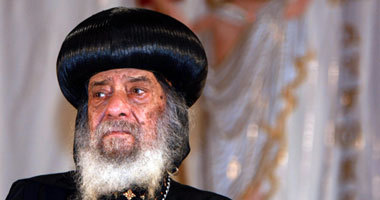
Five candidates -- two bishops and three monks-- are vying to become the 118th Pope of Alexandria and Patriarch of all Africa on the Holy See of St. Mark the Apostle.
A council made up of senior clergy, current and former Coptic public officials, MPs, local councillors and journalists will cast ballots for a new pope on Monday.
The names of the top three candidates will then be written on separate pieces of paper and placed in a box on the altar of St. Mark's Cathedral in Cairo according to church bylaws for the selection of their leader.
On November 4, a child from the congregation will be blindfolded and asked to choose one of the three pieces of paper. The chosen name will become the new Coptic Pope who will be enthroned in a ceremony on November 18.
The five candidates are Bishop Rafael, 54, a medical doctor and the current Assistant Bishop for Central Cairo; Bishop Tawadros of Nile Delta province of Beheira, 60; Father Rafael Ava Mina, the oldest of the five candidates at 70; Father Seraphim al-Souriani, 53 and Father Pachomious al-Souriani, 49.
The five have been visiting churches and holding sermons across the country ahead of the voting.
Copts around the world were asked to fast for three days before the voting and a second period of fasting will begin on October 31, said Bishop Paul spokesperson for the papal nominations.
One bishop who did not make it to the list of finalists is the hardline Bishop Bishoy "because of his fierce attacks on other denominations and his previous statements to the press that could have sparked sectarian sedition in the country," said the state-owned Egyptian Gazette in a recent editorial.
Bishoy came under fire after he questioned the authenticity of some verses of the Koran. His exclusion suggests the church is trying to keep controversial figures out of the race.
Egypt's Christians, who officially make up six to 10 percent of the 83 million population, have regularly complained of discrimination and marginalisation, even under the secular regime of president Hosni Mubarak, who was toppled last year.
The rise of Islamists since, and the election of the country's first Islamist president, Mohamed Morsi, have sparked fears of further persecution at home despite Morsi's repeated promises to be a president "for all Egyptians."
"We reject the notion of a religious state that would prevent us from exercising our freedom as Copts," said Bishop Morcos, chair of the Coptic Church's influential media committee in an interview with the state owned Al-Ahram weekly.
"The state should be ruled by law and not religion," he said.
His comments highlight the current tussle between Islamists and other groups over the role of religion in post-Mubarak Egypt, with an Islamist-led committee drafting the country's new constitution.
Contentious topics include the role of religion, the status of women and the scope of freedom of expression and faith.
-----------------------------------------------------------------------------------------------
A council made up of senior clergy, current and former Coptic public officials, MPs, local councillors and journalists will cast ballots for a new pope on Monday.
The names of the top three candidates will then be written on separate pieces of paper and placed in a box on the altar of St. Mark's Cathedral in Cairo according to church bylaws for the selection of their leader.
On November 4, a child from the congregation will be blindfolded and asked to choose one of the three pieces of paper. The chosen name will become the new Coptic Pope who will be enthroned in a ceremony on November 18.
The five candidates are Bishop Rafael, 54, a medical doctor and the current Assistant Bishop for Central Cairo; Bishop Tawadros of Nile Delta province of Beheira, 60; Father Rafael Ava Mina, the oldest of the five candidates at 70; Father Seraphim al-Souriani, 53 and Father Pachomious al-Souriani, 49.
The five have been visiting churches and holding sermons across the country ahead of the voting.
Copts around the world were asked to fast for three days before the voting and a second period of fasting will begin on October 31, said Bishop Paul spokesperson for the papal nominations.
One bishop who did not make it to the list of finalists is the hardline Bishop Bishoy "because of his fierce attacks on other denominations and his previous statements to the press that could have sparked sectarian sedition in the country," said the state-owned Egyptian Gazette in a recent editorial.
Bishoy came under fire after he questioned the authenticity of some verses of the Koran. His exclusion suggests the church is trying to keep controversial figures out of the race.
Egypt's Christians, who officially make up six to 10 percent of the 83 million population, have regularly complained of discrimination and marginalisation, even under the secular regime of president Hosni Mubarak, who was toppled last year.
The rise of Islamists since, and the election of the country's first Islamist president, Mohamed Morsi, have sparked fears of further persecution at home despite Morsi's repeated promises to be a president "for all Egyptians."
"We reject the notion of a religious state that would prevent us from exercising our freedom as Copts," said Bishop Morcos, chair of the Coptic Church's influential media committee in an interview with the state owned Al-Ahram weekly.
"The state should be ruled by law and not religion," he said.
His comments highlight the current tussle between Islamists and other groups over the role of religion in post-Mubarak Egypt, with an Islamist-led committee drafting the country's new constitution.
Contentious topics include the role of religion, the status of women and the scope of freedom of expression and faith.
-----------------------------------------------------------------------------------------------









 Home
Home Politics
Politics









